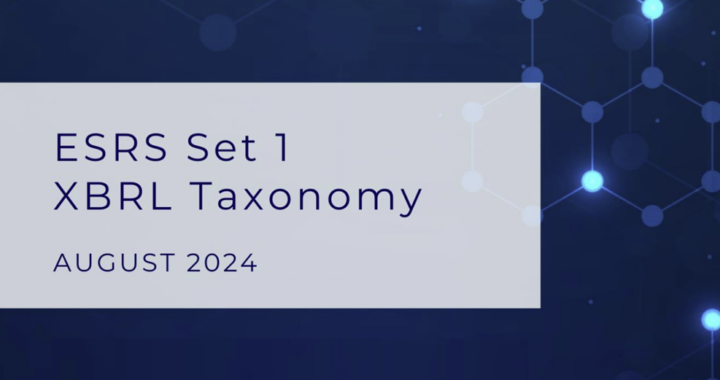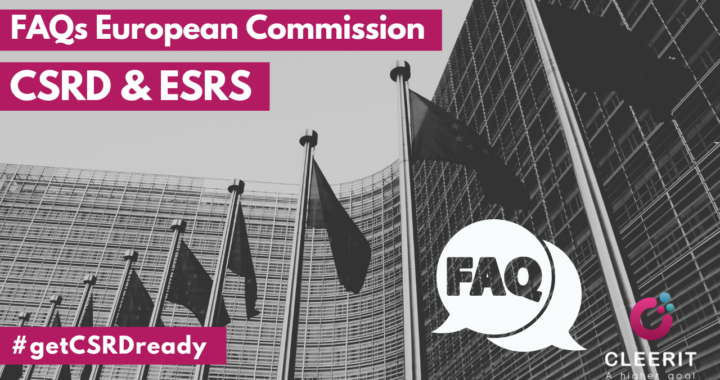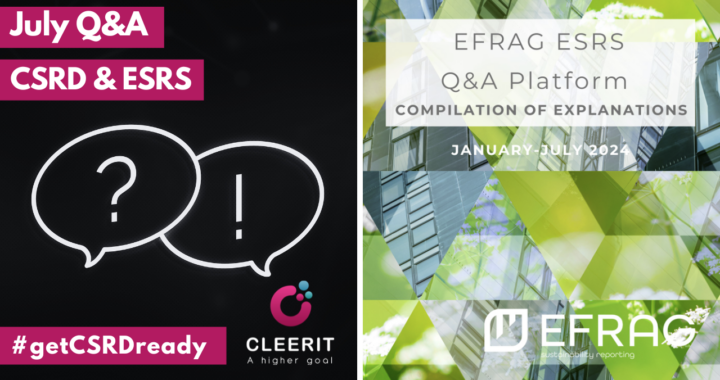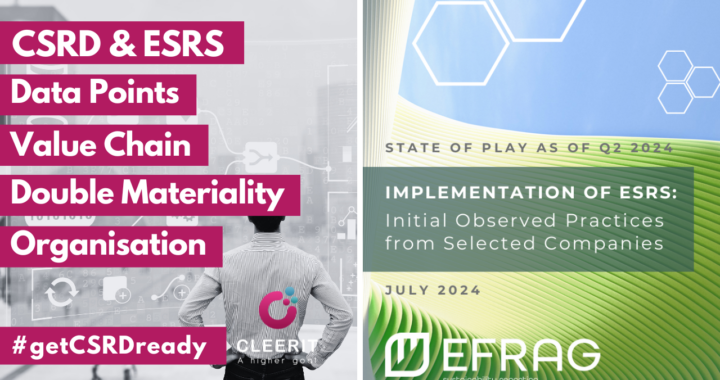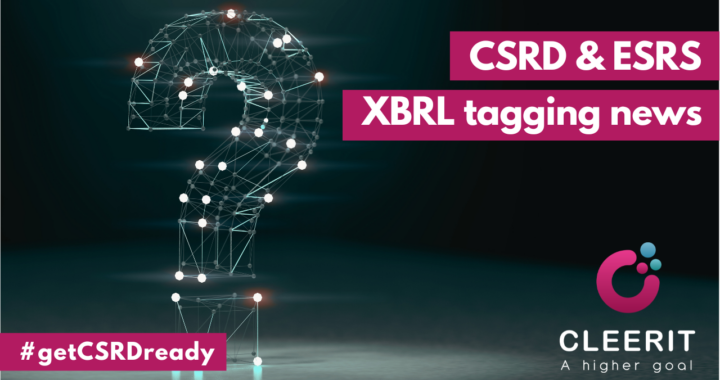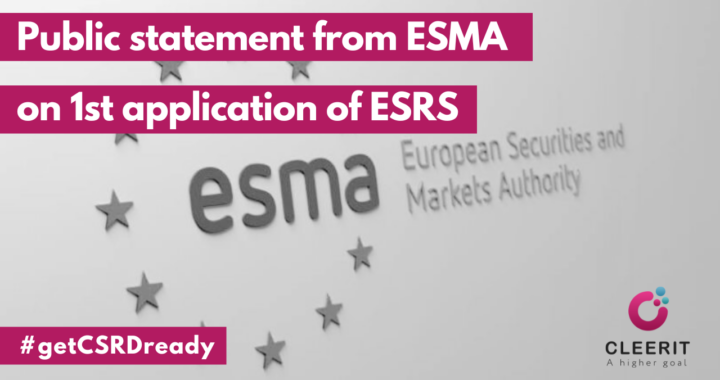It’s not easy being a first-time ESRS report preparer. But it’s not easy being a first-time ESRS report auditor either. All parties are learning ESRS and navigating uncharted territory.
EU auditors do not yet have a specific standard for ESRS auditing, but the ESRS standards provide detailed instructions, and EFRAG, ESMA and the European Commission have published important clarifications and guidance in July-August 2024 (see links in the below article).
National authorities have also provided additional guidance for auditors and preparers (H2A and ANC in France and FAR in Sweden, for example).
And on 20 September 2024 the IAASB approved International Standard on Sustainability Assurance (ISSA) 5000, expected to be formally publish by the end of the year.
So, things should get easier with time.
Meanwhile, we have noted that there is some confusion on critical topics that can complicate life for both first-time report preparers and auditors.
In this article we aim to provide some clarity into some of these topics: Materiality scores & thresholds, DMA & ESRS audit, Omission of disclosure of material metrics, and Incorporation by reference.
⭕ Materiality scores & thresholds
There are key words to determine materiality: Judgement, Objectivity and Transparency.
We hear from preparers that some auditors require calculated materiality scores and thresholds to approve DMA conclusions.
This often leads preparers to establishing mathematical formulas – often without scientifically / objectively supportable evidence – to engage in calculations ending up in conclusions that may very well obscure common sense and management judgment.
EFRAG’s DMA implementation guidance (IG1), specifically states that:
- The performance of a materiality assessment based on objective criteria is pivotal to sustainability reporting.
- The preparer will use judgement when applying the criteria, and the related explanations are expected to provide transparency from the undertaking to the users of the sustainability statement.
Indeed, ESRS 2 (IRO 1-2) require transparency on the judgement exercised – that is: quantitative or qualitative thresholds and other criteria used.
But ESRS do not mandate a specific process – nor specific thresholds to determine when a matter or information is material or not – when performing the materiality assessment.
This is left to the judgement of the preparer who needs to take into account its own specific facts and circumstances – as long as the criteria set in ESRS 1 are applied.
The need for judgement will be higher whenever the information and evidence about the materiality of a given IRO is inconclusive.
And, when setting up thresholds, priority should be given to any supportable evidence that provides as much objectivity as possible to the materiality conclusion.
⭕ DMA & ESRS audit
The European Commission has specified that auditors “are expected to perform procedures that enable them to conclude that no matter has come to their attention to cause them to believe that the information included in the sustainability statement is not fairly presented, in all material respects, in accordance with ESRS.
This entails an opinion on:
- whether the preparer’s sustainability statement, including the process to identify the information reported (i.e., the double materiality assessment process), are compliant with ESRS; and
- whether the outcome of this process has resulted in the disclosure of all material sustainability-related impacts, risks and opportunities of the preparer in accordance with ESRS.”
This is consistent with EFRAG’s implementation guidance IG1, paragraph 26:
If the undertaking identifies a large number of IROs, it may prioritise them for management purposes.
However, for reporting purposes this assessment should not exclude any material IROs, particularly when the undertaking has not addressed or fully addressed these material IROs through its policies, targets and action plans.
EFRAG’s implementation guidance IG1 also summarises the reasoning in paragraph 44:
- (a) the goal of the assessment is to identify the material IROs related to matters to be reported (ESRS 2 SBM 3);
- (b) the matter is assessed as material when material impacts and/or material risks or opportunities arise from it (ESRS 1 paragraph 43 and 49); and
- (c) for each material matter, the undertaking determines the information to be reported in accordance with the cross-cutting or topical standards (ESRS 1 paragraph 30).
⭕ Omission of disclosure of material metrics
For metrics ESMA notes that, as a general rule, the ESRS do not envisage cases in which the lack of data justifies the omission of disclosure of material information, if not explicitly covered by the transitional provisions set out in paragraphs 131-134 and Appendix C of ESRS 1. (Public statement July 5, page 8 paragraph 35)
Indeed, there is a distinction between reporting on policies, actions and targets, and reporting on metrics. (Appendix E and paragraph 71 in ESRS 1)
Material metrics have to be reported from year one, and the level of measurement uncertainty of metrics is not a reason for omitting them. If the metric cannot be determined through direct data collection, it shall be estimated. (ESRS 1 paragraph 45, EFRAG Q&A platform, question ID 504)
Quantitative metrics and monetary amounts disclosed that are subject to a high level of measurement uncertainty have to be listed in DP ESRS 2, 11a with explanations on assumptions, approximations, judgements and sources of measurement uncertainty described in DP ESRS 2, 11b.
Value-chain information on metrics can be phased-in, except for metrics derived from EU law, such as Scope 3 GHG emissions.
ESRS require undertakings to use estimates if they cannot obtain all necessary value chain information after having made reasonable efforts to do so (ESRS 1, paragraph 69 and EC FAQ 29 page 28).
The concept of “reasonable effort” is linked to Value Chain information, and not to metrics as such. And even so, material metrics have to be at least estimated.
When metrics include upstream and/or downstream value chain data estimated using indirect sources, such as sector-average data or other proxies, planned actions to improve accuracy in such estimates should be described in DP ESRS 2, 10d.
⭕ Incorporation by reference
Incorporation by reference is authorized, if the below conditions are met. But priority should be given to preserving the overall cohesiveness and readability of the sustainability statement. Therefore, they should not be applied excessively.
ESMA notes that Section 9.1 of ESRS 1 allows to incorporate by reference separate and clearly identifiable elements of information, subject to safeguards aiming at preserving the overall cohesiveness and readability of the sustainability statement.
EFRAG notes that the conditions for such incorporation, set in ESRS 1 paragraph 120, do not allow the incorporation of disclosures from any source or document outside of the Inline XBRL Document set (for example, from information provided on the webpage of the company or in a separate PDF).
Inline XBRL continuations provide flexibility in order to incorporate single disclosures by reference from different sections of the report.
However, EFRAG also notes that those should not be used excessively and should be applied carefully in order not to lose the context of information provided.
⭕ Sources of information
Information in these publications critical to understanding what is expected, for both preparers and auditors – in addition to carefully reading the ESRS.
May 2024 – EFRAG DMA Implementation Guidance IG1:
5 July 2024 – ESMA:
https://www.esma.europa.eu/sites/default/files/2024-07/ESMA32-992851010-1597_-_ESRS_Statement.pdf
Jan-July 2024 – EFRAG FAQ:
8 August 2024 – European Commission FAQ:
30 August 2024 EFRAG:
https://www.efrag.org/en/news-and-calendar/news/efrag-publishes-the-esrs-set-1-xbrl-taxonomy
June 2023 Technical sustainability assurance guidelines issued by French H3C, now H2A:
June 2023 Draft guidelines for limited assurance engagements on sustainability reporting under the CSRD issued by the Committee of European Audit Oversight Bodies (CEAOB):
The objective of the CEAOB guidelines is to facilitate the harmonisation of the sustainability assurance across the EU before the European Commission (EC) adopts EU limited assurance standard in 2026.
These publications have been used as sources for the above explanations.
—
Stay tuned for more CSRD and ESRS insights.
✅ Adopt an audit-ready, collaborative and taxonomy-centric ESRS report preparation with Cleerit ESG.
#getCSRDready, #CSRD, #ESRS, #CSDDD, #ESG, #Strategy, #Governance, #SustainabilityReporting, #Digitalisation, #CleeritESG

